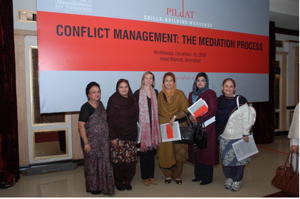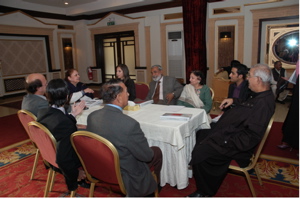On December 16th, at the request of the Pakistani Institute of Legislative Development and Transparency (PILDAT), ETC/I Senior Program Officer Nina Sughrue conducted a one-day conflict management session for 18 Pakistani parliamentarians, eight members of the parliamentary staff, 17 representatives of the political parties’ youth wings, nine members of the youth parliament, 10 members of the press, and six politically active civil society leaders in Islamabad.
On December 16th, at the request of the Pakistani Institute of Legislative Development and Transparency (PILDAT), ETC/I Senior Program Officer Nina Sughrue conducted a one-day conflict management session for 18 Pakistani parliamentarians, eight members of the parliamentary staff, 17 representatives of the political parties’ youth wings, nine members of the youth parliament, 10 members of the press, and six politically active civil society leaders in Islamabad. This is the fourth and final training in a series of capacity-building workshops, the first of which was ETC/I's first workshop conducted in Pakistan. The previous workshop was held in August 2009. PILDAT received a grant from the British High Commission, Islamabad through the UK’s Strategic Priority Fund for this project. The project was aimed at building conflict resolution capabilities of Members and relevant staff from the National and Provincial Assemblies, the Federally Administered Northern Areas and Azad Jammu Kashmir, and political party youth groups. The December 16th training was primarily for the youth wings of the political parties and the youth parliament.
previous workshop was held in August 2009. PILDAT received a grant from the British High Commission, Islamabad through the UK’s Strategic Priority Fund for this project. The project was aimed at building conflict resolution capabilities of Members and relevant staff from the National and Provincial Assemblies, the Federally Administered Northern Areas and Azad Jammu Kashmir, and political party youth groups. The December 16th training was primarily for the youth wings of the political parties and the youth parliament.
The 18 members of the National Assembly represented the following political parties: Muttahida Majlis-e-Amal (MNA), Muttahida Quami Movement (MQM), Pakistani Muslim League Nawaz (PML-N), Pakistan Muslim League Quaid-i-Azam (PML-Q),and Pakistan People’s Party Parliamentarians (PPPP). The representatives of the political parties and the youth wings included the President of the Shabab-e-Mili, the President and members of the Women’s Wing and Central Women’s Wing of the PML, members of the youth force of Markazi Jamiat-e-Ahl-e-Hadeeth, a member of the youth wing of the PPPP and a former senator of the central executive committee of the PPPP. The nine youth parliament members were current members, and the media outlets were Geo News, Waqr News, PTV News, PTV News, the Daily Nawa-e-Waqt, Aaj TV, and Power Radio 99 FM. The Special Secretary of the Senate of Pakistan, the Deputy Secretary, Legislation of the National Assembly also attended.
Nawa-e-Waqt, Aaj TV, and Power Radio 99 FM. The Special Secretary of the Senate of Pakistan, the Deputy Secretary, Legislation of the National Assembly also attended.
The one-day session included modules on conflict analysis and conflict resolution ripeness. After our USIP lecture, the participants were broken up into groups where they each identified an active conflict which they might have some influence in helping resolve as a parliamentarian, applying the USIP training. Two groups came up with the same conflict, a water conflict in north west Pakistan that is currently known in Parliament to become potentially violent. The two groups came up with a similar analysis and mediation strategies and agreed to work together further on this in their capacities as parliamentarians.
The feedback from the session was highly positive, since for all of the participants this was their first experience with conflict resolution training. Many stated that this is exactly the type of training that is needed in Pakistan, and the training should be expanded to several days.



